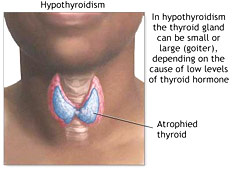


Hypothyroidism Overview
 Hypothyroidism as a term refers to any condition that leads to decrease in levels of thyroid hormones (T3 & T4) in blood. When it affects in infants it is called cretinism.
Hypothyroidism can be caused by conditions of the thyroid as well as other disease, which may indirectly affect the thyroid. Women are affected by hypothyroidism more than men, especially as they age.
As the thyroid hormones control the metabolism (how energy is used) of the body a decrease in their level can lead to affects on growth, development, and many cellular processes, inadequate thyroid hormone has widespread consequences for the body.
Hypothyroidism as a term refers to any condition that leads to decrease in levels of thyroid hormones (T3 & T4) in blood. When it affects in infants it is called cretinism.
Hypothyroidism can be caused by conditions of the thyroid as well as other disease, which may indirectly affect the thyroid. Women are affected by hypothyroidism more than men, especially as they age.
As the thyroid hormones control the metabolism (how energy is used) of the body a decrease in their level can lead to affects on growth, development, and many cellular processes, inadequate thyroid hormone has widespread consequences for the body.
What are the causes of Hypothyroidism?
Top
Hypothyroidism is a very common condition. It affects women more than men, especially as they age.
The common causes of Hypothyroidism are:
- Hashimoto's thyroiditis: Hashimoto's is an autoimmune disease in which the body's immune system inappropriately attacks the thyroid tissue. In part, this condition is believed to have a genetic basis. This means that the tendency toward developing Hashimoto's thyroiditis can run in families.
- Thyroid destruction (from previous hyperthyroid treatment): It occurs in certain cases were treatment for hyperthyroidism has lead to destruction of thyroid gland.
- Pituitary or hypothalamic disease: As pituitary and hypothalamus both govern the functioning of thyroid gland any disease condition affecting both these glands can lead to hypothyroidism even if thyroid gland is normal
- Medications: Certain drugs like lithium and amiodarone can cause hypothyroidism
- Severe iodine deficiency: As thyroid gland uses iodine for normal functioning its deficiency can lead to hypothyroidism.
What are the sign and symptoms of Hypothyroidism?
Top
As thyroid gland controls the metabolism (the rate at which energy is used) it affects can be varied having widespread consequences on the body, depending upon the level of thyroid hormones.
Patients with mild hypothyroidism may have no signs or symptoms as the disease progresses the most common symptoms are:
Patients with mild hypothyroidism may have no signs or symptoms as the disease progresses the most common symptoms are:
- Hoarse voice
- Poor appetite
- Fatigue
- Depression
- Weight gain
- Difficulty in loosing weight
- Cold intolerance
- Excessive sleepiness
- Dry, coarse hair
- Constipation
- Dry skin
- Muscle cramps
- Increased cholesterol levels
- Decreased concentration
- Vague aches and pains
- Swelling of eyes and face
- Swelling of the legs
- Irregular menses
- Infertility
How is Hypothyroidism diagnosed?
Top
The history and physical examination generally reveal the characteristic symptoms and physical signs that suggest hypothyroidism; but usually a blood test is required to confirm the diagnosis.
The levels of TSH are monitored which are elevated indicating hypothyroidism. But in cases were there is secondary (were pituitary is involved) or tertiary (were hypothalamus is involved)hypothyroidism there TSH levels can be normal or below normal. In these cases a special test TRH may be required.
Imaging studies like X-ray, Ultrasound and CT scan may be prescribed to rule out any thyroid pathology or in cases of secondary and tertiary thypothyroidism.
What is the role of Homoeopathy in Hypothyroidism?
Top
As described in the article above Hypothyroidism has multifactor ail causes. Homoeopathy follows an individualistic approach towards patients suffering from Hypothyroidism we believe that every individual is different and thus a full in-depth case study is the first step. Then referring to the risk factors the individual was subjected too, a particular line of treatment is adopted. The usual conventional treatment provides only palliation. On the other hand our deep acting constitutional medicine cure the disease in depth rendering the patient free from the disease
A broad criterion of how the homoeopathic medicines act in cases of Hypothyroidism is mentioned below. The response to treatment can differ from one individual to another patients are advised to consult so that the mode of treatment can be discussed pertaining to their particular case
Relieving Symptoms:
Controlling and curing the underlying disease process
A broad criterion of how the homoeopathic medicines act in cases of Hypothyroidism is mentioned below. The response to treatment can differ from one individual to another patients are advised to consult so that the mode of treatment can be discussed pertaining to their particular case
Relieving Symptoms:
Controlling and curing the underlying disease process
- If homoeopathic treatment is sought early it helps in preventing the progress of disease and preventing any complications
- We at DRSS provide our patients with diet charts, exercise schedules and guide them how to modify their lifestyle so that better results can be achieved.
- Our medicines can be started with conventional treatment depending upon the disease state and case.
- Homoeopathic medicines if taken under proper guidance from a well-qualified professional are extremely safe and have no side effects.

Hypothyroidism




